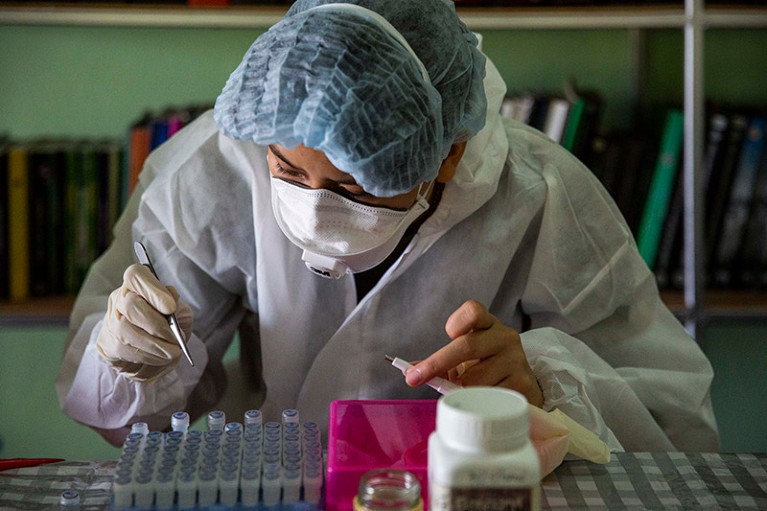Thailand experienced the biggest relative jump in extremely productive researchers between 2016 and 2022.Credit: Lauren DeCicca/Getty
Up to four times more researchers pump out more than 60 papers a year than less than a decade ago1. Saudi Arabia and Thailand saw the sharpest uptick in the number of such scientists over the past few years, according to a preprint posted on bioRxiv on 24 November. The increase in these ‘extremely productive’ authors raises concerns that some researchers are resorting to dubious methods to publish extra papers.
“I suspect that questionable research practices and fraud may underlie some of the most extreme behaviours,” says study co-author John Ioannidis, a physician specializing in metascience at Stanford University in California. “Our data provide a starting point for discussing these issues across all science.”
Ioannidis and his colleagues examined articles, reviews and conference papers indexed in the Scopus database between 2000 and 2022. They excluded physics authors, who tend to publish large numbers of papers because authorship practices in this field differ from those of other subjects. The researchers tracked how extremely productive authorship has changed over time in various countries and fields.
Overall, most extremely productive authors outside of physics were in clinical medicine, which had nearly 700 of these supercharged researchers in 2022 (see ‘Hyper-productive fields’). Agriculture, fisheries and forestry saw the speediest growth in extremely productive researchers, increasing by 14 times between 2016 and 2022, followed by biology and mathematics and statistics.
In 2022 alone, 1,266 non-physics authors published the equivalent of one paper every 5 days, including weekends, compared with 387 in 2016. The accelerated growth since 2016 was surprising, says Ioannidis, because an earlier analysis2 showed that extreme productivity was beginning to plateau in 2014. “There has been a very fast increase,” he says.
Source: Ref. 1.
Outside physics, most countries more than doubled the number of extremely productive authors between 2016 and 2022, although some nations saw even bigger leaps (see ‘Extreme growth’). Thailand jumped from 1 extremely productive author in 2016 to 19 in 2022, the largest relative increase of all countries. However, Saudi Arabia saw the biggest growth in absolute terms, rising from 6 to 69 extremely productive authors over the same period.
Thailand has only a handful of authors who churn out huge volumes of papers each year, but the sudden increase in extreme productivity is concerning, says Tirayut Vilaivan, a member of the Office of Academic and Research Integrity at Chulalongkorn University in Bangkok, which develops research policies and standards. “We cannot ignore that,” he says.
Underlying factors
The uptick could be driven at least in part by the country’s research-funding system, which has switched to favouring large interdisciplinary teams instead of small groups, making it easier for researchers to get their names on more papers, says David Harding, a chemist at Suranaree University of Technology in Nakhon Ratchasima, Thailand. “Thailand has undergone a radical overhaul of its research ecosystem in an attempt to improve productivity,” says Harding.
Another contributing factor might be Thailand’s focus on university rankings, which are underpinned by publication numbers and metrics, says Vilaivan. He adds that many universities in the country use cash incentives to encourage researchers to publish in prominent journals. If researchers play their cards right, they can earn up to 1 million Baht (US$28,000) a year through publications alone, he says .
Source: Ref. 1.
The combination of such a burgeoning ‘publish or perish’ culture and a monetary reward system creates fertile grounds for shady actors to flourish, adds Vilaivan. During the pandemic, paper mills — illegal businesses that sell fake papers to researchers — began surfacing in Thailand, he says.
Crackdown on questionable practices
But Thailand is beginning to investigate researchers who have a suspiciously high number of published papers. In January, the Ministry of Higher Education, Science, Research and Innovation investigated whether misconduct was taking place at Thailand’s universities by examining researchers with unusually prolific publication records or several papers outside their expertise. The probe found that 33 researchers at 8 universities had paid for authorship, with dozens of other people suspected of listing their names on papers they had bought.
Ioannidis thinks that, to stem the rising tide of extremely productive authors, research institutions and funding agencies should focus on the quality of a researcher’s work instead of on the volume of papers they publish. This would prevent scientists from cutting corners. “The number of papers should not really count as positive or negative,” he says.
